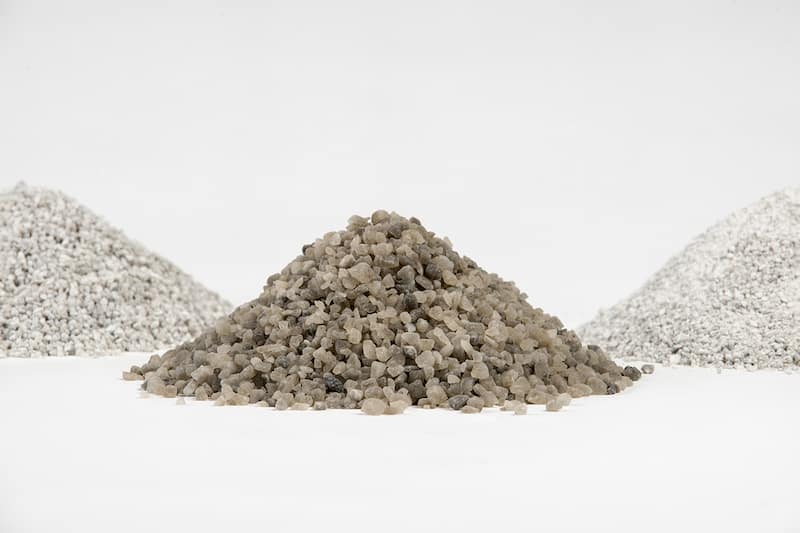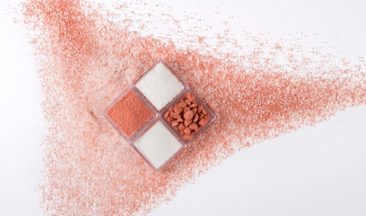Organic Polysulphate fertilizer begins life as Polyhalite rock, deep beneath the North Sea. Read on to see how we go from rock to fork, from the most natural fertilizer in the world to healthy, nutritious, environmentally friendly food.
The Evolution of Natural Fertilizers
Humans may have been using fertilizers to improve crop yields and crop quality for at least 8,000 years. The earliest innovations were probably the result of noticing that plants exposed to animal manure grew better. Ancient cultures continued to use manure, as well as wood ash, and minerals. Guano and ground bone meal were popular with more modern agronomists, who also experimented with advanced crop rotation systems.
The industrial revolution, with its growing populations and urgent need for improved farming technology, stimulated a systematic scientific exploration of chemical fertilizers. Scientists and agronomists analyzed the performance of various chemicals as plant nutrients. By the 20th century, the global fertilizer market was dominated by mass-produced nitrogen-based fertilizers. These affordable nutrients contributed to the massive postwar agricultural production boom known as the Green Revolution or the Third Agricultural Revolution.
The 21st century is already seeing a fundamental shift towards more sustainable agriculture. There is an emphasis on localized farming solutions that are environmentally friendly, scalable, economically efficient, and deliver a low carbon footprint. A key component of sustainable agriculture is natural fertilizers..
What is Polysulphate
Polysulphate fertilizer is mined in the UK. It is found over 1km beneath the North Sea. The original Polyhalite rock bed was deposited over 260 million years ago. Polysulphate contains four core nutrients in one single crystal that make it an excellent natural fertilizer. These nutrients are steadily released into the soil and available for plant uptake:
- Sulfur
- Potassium
- Magnesium
- Calcium
The extraction of Polysulphate is cost-effective and there are minimal production requirements prior to sale. Crucially, Polysulphate does not require any refinement or the addition of other chemicals. Newly mined Polysulphate simply has to be screened and crushed to achieve the desired granulation and pellet size to be ready for packaging and shipping.
Polysulphate fertilizer is a ‘clean’ product that can be mass-produced with minimal environmental impact and has the lowest carbon footprint of any other commercially available fertilizer.
Why are Polysulphate Fertilizers so Good for Crops?
Besides containing a good balance of the four key nutrients that suit all crops and soil types, Polysulphate fertilizer granules release nutrients into the soil at a gradual rate, thus growing plants receive steady and prolonged nutrition through all the crop growth cycle
Polysulphate is also low in chlorides and is free of any other substances that may be detrimental to crops, soil, or the local environment. Its prolonged release of nutrients makes it less prone to leaching losses thus preserving the environment.
As a 4 in 1 natural fertilizer, Polysulphate can usually be used as a stand-alone nutrient requiring zero maintenance.
The granules are simply spread as required and left to dissolve naturally into the soil. There is no loss from runoff, leaching, or evaporation. Polysulphate can also be applied as a blend with other fertilizers or can be used as a raw material for manufacturing compound fertilizers.
Polysulphate fertilizers have been shown to improve crop yields in more than 700 trials conducted around the world in different crops such as coffee, tomatoes, grapevines, pastures, cereals, oil crops, and many other field crops, orchards, and plantations.
You may be interested in reading:
Osmocote 5 – controlled release fertilizer technology
The Need for an Organic Sustainable Fertilizer
Consumer demand for organic, or at least healthy food products is growing. The Baby Boomer generation’s delight at the 20th-century miracle of cheap, mass-produced food (at least in the Developed World) has evolved into a requirement for better quality food. This consumer awareness is extending into the farming methods that produce the food we eat.
The key difference is that the 21st-century concept of sustainable agriculture is consciously built on an ethical foundation. An underlying goal is to create a balanced and harmonious global agricultural economy. This means avoiding soil depletion, reducing the carbon footprint at every stage of the production and supply chain, and minimizing waste.
This sustainable fertilizer is ideal for corporate industrial farming, individual farmers on small lands, smallholders, as well as nurseries, urban gardeners, and even ornamental gardeners.
The ability to bring to market a packaged food as having been produced with sustainable organic fertilizer is a strong selling point. The bottom line is that sophisticated modern consumers expect to see sustainable solutions as an integral part of the production and supply chain. In an increasingly ethical food market, the potential financial benefits of using organic sustainable fertilizers extend across the entire sales spectrum, from field to grocery store.
Polysulphate is a natural product that is mined directly from the earth. Used correctly, it enriches the soil, producing stronger and healthier crops. End consumers can enjoy their food, knowing that they made a more ethical and environmentally friendly purchase and are eating potentially healthier meals.
Polysulphate fertilizer is approved for use in organic agriculture and has organic certificates in UK, France, Germany, Austria, Italy, the Netherlands, Hungary, Poland, Brazil, and Israel. In addition, Polysulphate standard and granular grades are OMRI-listed for organic use in the USA and Canada.
Polysulphate has been included on the international list of inputs allowed for organic farming according to EC 834/2007, NOP (National Organic Program, USA), and JAS (Japanese Agriculture Standard) regulations.
The Role of Polysulphate Fertilizers in Reducing Carbon Footprint
Polysulphate is not just ideal for improving crop yields, and the quality and health of individual crops, it is also a clean product.
- It is completely natural
- It has a low carbon footprint
- It is screened and crushed close to the source
- The Polysulphate is not refined or adulterated
- Processed granules are packaged and shipped efficiently
- The current choice of 4 granule types further reduces waste
- It provides four essential nutrients to the crops in just one application.
Polysulphate fertilizer is not only an excellent option for organic farmers but also for conventional farmers who are looking for a low-cost, environmentally positive source of four key nutrients for their crops. Along with prolonged multi-nutrient availability and ease of application to a wide range of crops, low carbon footprint is now another benefit of Polysulphate that is attractive to organic and conventional producers alike.
Polysulphate is at the heart of ICL’s sustainable agricultural vision. We’ve seen the results of our organic fertilizer on crop yields across the world. We also analyzed feedback from agronomists, community project managers, and the farmers themselves – both on a major industrial level and at a small local level.
More than anything, their enthusiasm for Polysulphate has convinced us that it should be at the heart of our sustainable agriculture strategy. As a global company, ICL is close to its markets. We can implement efficient shipping and transportation processes and focus on reducing carbon gas emissions.
ICL is determined to build on its role as an industry leader. As the world’s only manufacturer of Polysulphate, we are in an excellent position to help promote sustainable agriculture and tackle world hunger.







